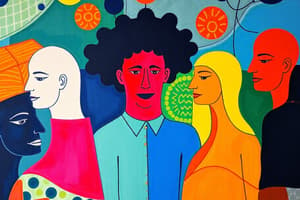Podcast
Questions and Answers
What is the primary function of language in the transmission of cultural ideas?
What is the primary function of language in the transmission of cultural ideas?
- To allow the recreation and maintenance of society through generations (correct)
- To create symbols that reflect cultural elements
- To store knowledge and contemplate the writings of past societies
- To convey meaning to one group through religious artifacts
What is the significance of symbols in a culture?
What is the significance of symbols in a culture?
- They are culturally absolute
- They help to define reality
- They convey meaning and power (correct)
- They provide endless possibilities for communication
What is a characteristic of beliefs in a culture?
What is a characteristic of beliefs in a culture?
- They are based on material culture
- They are universally absolute
- They are culturally relative (correct)
- They are fixed and unchanging
What is the purpose of material culture in a society?
What is the purpose of material culture in a society?
What is a function of beliefs in a culture?
What is a function of beliefs in a culture?
What is the primary purpose of formal negative sanctions in a society?
What is the primary purpose of formal negative sanctions in a society?
What is the relationship between symbols and their meanings?
What is the relationship between symbols and their meanings?
Which of the following is an example of a positive sanction?
Which of the following is an example of a positive sanction?
What is the primary function of language in culture?
What is the primary function of language in culture?
What is the relationship between laws and folkways or mores?
What is the relationship between laws and folkways or mores?
What is the primary difference between formal and informal sanctions?
What is the primary difference between formal and informal sanctions?
What is the purpose of cultural norms in a society?
What is the purpose of cultural norms in a society?
What is the primary difference between material and nonmaterial culture?
What is the primary difference between material and nonmaterial culture?
What is one of the functions of culture that enables us to understand what is considered acceptable behavior in society?
What is one of the functions of culture that enables us to understand what is considered acceptable behavior in society?
What is an example of a nonmaterial aspect of culture that is shared by members of a society?
What is an example of a nonmaterial aspect of culture that is shared by members of a society?
What is a consequence of cultural variations?
What is a consequence of cultural variations?
What is the role of culture in meeting sustenance needs?
What is the role of culture in meeting sustenance needs?
What is the relationship between culture and time and place?
What is the relationship between culture and time and place?
What is the primary difference between acculturation and interculturation?
What is the primary difference between acculturation and interculturation?
What is the primary function of culture, according to the Structural Functional Analysis perspective?
What is the primary function of culture, according to the Structural Functional Analysis perspective?
What is the result of globalization on local cultures?
What is the result of globalization on local cultures?
What is the primary difference between discovery and invention?
What is the primary difference between discovery and invention?
What is the nature of perspectives in a culture?
What is the nature of perspectives in a culture?
What is the result of long-term close contact between groups?
What is the result of long-term close contact between groups?
What was the perception of African religions by the colonizers?
What was the perception of African religions by the colonizers?
In which year did the Chinese immigrants start arriving in the Caribbean?
In which year did the Chinese immigrants start arriving in the Caribbean?
Why did the East Indians resist assimilation into the wider society?
Why did the East Indians resist assimilation into the wider society?
What is a characteristic of the cultural milieu in the Caribbean region?
What is a characteristic of the cultural milieu in the Caribbean region?
Which theory explains Caribbean society as a complex system of social stratification?
Which theory explains Caribbean society as a complex system of social stratification?
What was the result of the fusion of European and African cultures in the Caribbean?
What was the result of the fusion of European and African cultures in the Caribbean?
Flashcards are hidden until you start studying
Study Notes
Culture and Society
- Laws are formalized rules that are officially stated and enforced by a government, and may be based on folkways and mores.
- Sanctions are rewards or punishments for conforming to or violating cultural norms, and can be formal or informal.
- Only a small fraction of social behavior can be policed by formal agencies, and most sanctions are applied informally.
Language and Symbols
- Symbolic communication, including language, is a major component of culture.
- Language allows the transmission of cultural ideas through generations and enables interaction and recreation of society.
- Symbols can unify people or command respect and devotion, and their meanings can only be derived from their cultural context.
Beliefs
- Beliefs are ideas about what is true and help define reality.
- All cultures have accumulated many beliefs over time, providing a common basis for understanding the environment.
- Beliefs are culturally relative and can vary greatly between cultures.
Material and Nonmaterial Culture
- Material culture refers to the concrete and tangible aspects of a society, such as food, clothing, and technology.
- Nonmaterial culture includes intangible components, such as language, norms, values, and beliefs.
Functions of Culture
- Culture enables communication with others through language.
- It provides standards for distinguishing between right and wrong, beautiful and unpleasant, and reasonable and unreasonable.
- Culture provides methods for training children and meeting sustenance needs.
Cultural Variations
- Culture is relative to time and place, and what is considered normal in one culture may be unacceptable in another.
- Acculturation is the borrowing of cultural traits by one group from another, and can lead to the emergence of new culture.
Innovation and Globalization
- Innovation is the process of introducing a new idea or object to a culture, and can take the form of discovery or invention.
- Globalization allows international economic and political systems to dominate local cultures, leading to cultural homogenization.
Perspectives on Culture
- Culture is a shared perspective that is not absolute truth, and perspectives are limited by their nature.
- As we interact, we come to share ideas about the way the world is.
Cultural Dynamics
- The Caribbean region has a complex cultural milieu, with diverse cultural values and attitudes introduced by immigrant groups.
- The plantation system created a complex system of social stratification, with race and ethnicity creating divisions.
- Culture in the Caribbean is multifaceted, dynamic, and rich, with a fusion of European, African, and Asian cultural elements.
Studying That Suits You
Use AI to generate personalized quizzes and flashcards to suit your learning preferences.




